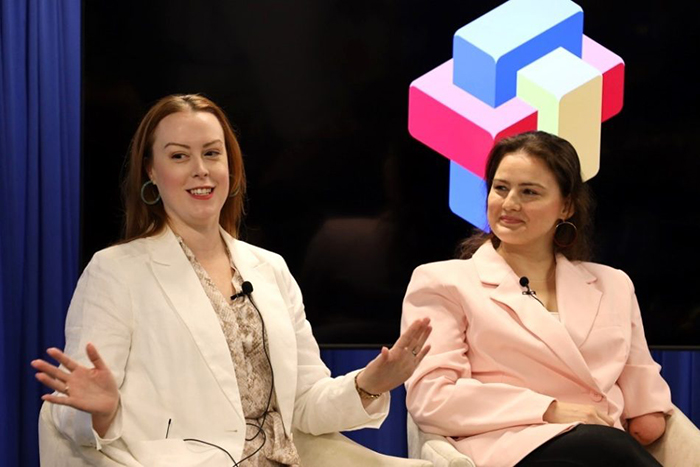Global Accessibility Awareness Day is an annual event aimed at fostering understanding and driving conversation about digital access and inclusion for the approximately 1.3 billion people worldwide experiencing significant disabilities.
Given Samsung’s deep commitment for meaningful technological innovation for all, it was fitting that during the final day of the 14th annual Samsung Solve for Tomorrow competition, which challenges public school students in grades 6-12 to apply science, technology, engineering, and math (STEM) skills to address pressing local issues, the Samsung Solve team hosted a panel discussion exploring The Intersection of Accessibility, Technology, & Inclusive Design.
Samsung Electronics America CMO Allison Stransky led the discussion with guests Anna Johannes, a U.S. Paralympic Bronze Medalist and Inclusive Design Strategist at Interbrand, and Rachel Sanford Nemeth, Consumer Technology Association (CTA) Senior Director of Regulatory Affairs.
The panelists shed light on the intersection of inclusivity, technology, and advocacy, providing insights for both Gen Z makers and educators — with Allison setting the stage by discussing the role of inclusivity in the workplace. Among the key insights they provided were:
Embracing Inclusivity as a Core Identity
Allison led off by asking, “How do you think about inclusivity in the work you do?” Anna emphasized, “When you’re born different, your inclusivity is who you are, and you take it everywhere you go,” crediting that for inspiring her life and work as an advocate for accessibility.
Putting Inclusivity at the Heart of Technology
In sharing her journey at the CTA, Rachel discussed how she became familiar with the extensive body of government regulations regarding accessibility and the significance of placing inclusivity at the forefront of technological advancements. She has continued to find inspiration in helping tech companies “put inclusivity at the heart” of what they do and make.
Illustrating How Accessible Innovations Shape Daily Life
Anna, born without a right hand, described how she uses technology in her daily life, saying the popular One Hand Mode feature on Galaxy smartphones, a capability that most consumers see as convenient way “to hold a phone in one hand and their coffee in the other,” in her case “that’s life for me. “Sometimes it’s the simplest innovations – like One Hand Mode or Voice to Text – often created by people with disabilities, that go on to become universal technologies,” she added.

The panelists discussed the myriad innovations the consumer tech industry displays at CES, the annual trade show owned and produced by the CTA, with Rachel noting how technology that starts out as something intended to be assistive to specific communities often becomes broadly adopted across the consumer market. She cited Closed Captioning as something that has evolved from being assistive tech for hearing-impaired TV watchers to technology embraced by social media users to get the essential messages of an Instagram post they are watching with the audio muted. Rachel called that a case where “innovation pushes the boundaries of what we think people need,” and where accessible technology “is not just for work, but for recreation and entertainment, too.”
Highlighting Legislative & Workplace Triumphs
Asked by Allison to name their biggest successes in the accessibility space – Rachel cited legislation opening the door for over-the-counter sale of hearing aids, while Anna drew appreciative laughter with her comment that “getting hired” to promote inclusive design was hers – because it has enabled her “to be in rooms like this one advocating for inclusivity.”
In showcasing the transformative power of inclusive design, the panelists also took time to praise two STEM solutions focused on accessibility that received high marks in this year’s competition:
• Brandywine High School (Wilmington DE) – recipient of both the National Winner and Rising Entrepreneurship Awards – developed electronic board games that assist special education students in forming enduring connections with their peers.
• Hoover High School (Hoover AL) – also a National Winner – created affordable door opening tech for people with neurological disorders affecting hand motor skills.
The panel was part of our Samsung Solve for Tomorrow Pitch & Reveal Event livestream – and is a testament to Samsung’s belief that “We navigate the landscape of innovation with inclusivity at its core.”
Reference
• Samsung Electronics Newsroom (US):
Samsung Solve for Tomorrow’s Inclusive Design Panel Celebrates Accessible Innovations






